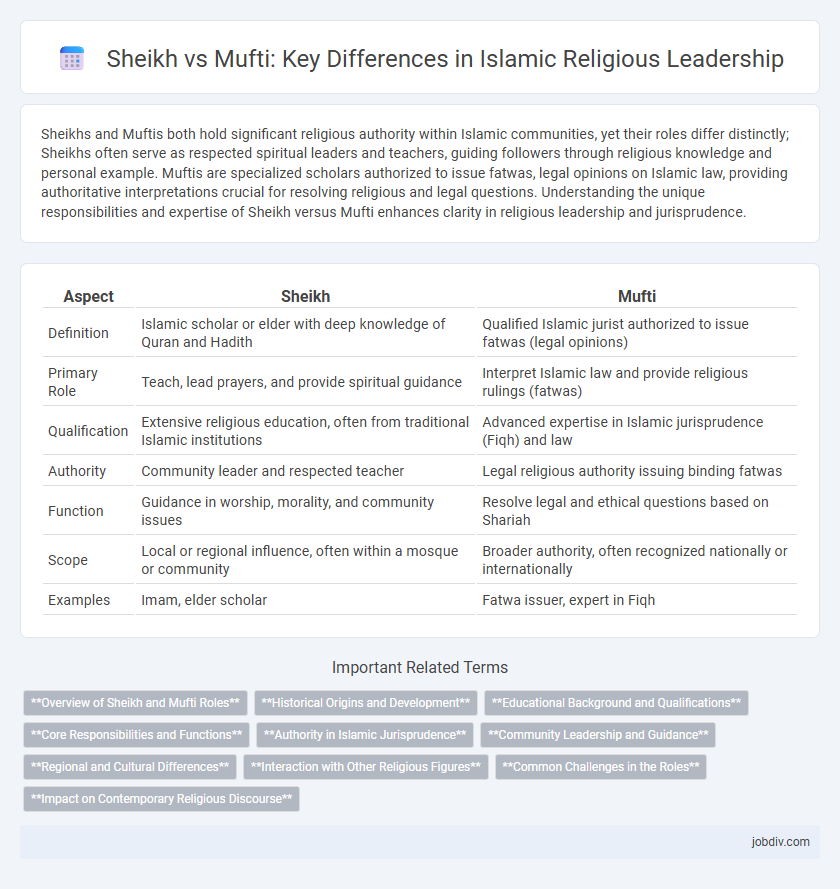Sheikhs and Muftis both hold significant religious authority within Islamic communities, yet their roles differ distinctly; Sheikhs often serve as respected spiritual leaders and teachers, guiding followers through religious knowledge and personal example. Muftis are specialized scholars authorized to issue fatwas, legal opinions on Islamic law, providing authoritative interpretations crucial for resolving religious and legal questions. Understanding the unique responsibilities and expertise of Sheikh versus Mufti enhances clarity in religious leadership and jurisprudence.
Table of Comparison
| Aspect | Sheikh | Mufti |
|---|---|---|
| Definition | Islamic scholar or elder with deep knowledge of Quran and Hadith | Qualified Islamic jurist authorized to issue fatwas (legal opinions) |
| Primary Role | Teach, lead prayers, and provide spiritual guidance | Interpret Islamic law and provide religious rulings (fatwas) |
| Qualification | Extensive religious education, often from traditional Islamic institutions | Advanced expertise in Islamic jurisprudence (Fiqh) and law |
| Authority | Community leader and respected teacher | Legal religious authority issuing binding fatwas |
| Function | Guidance in worship, morality, and community issues | Resolve legal and ethical questions based on Shariah |
| Scope | Local or regional influence, often within a mosque or community | Broader authority, often recognized nationally or internationally |
| Examples | Imam, elder scholar | Fatwa issuer, expert in Fiqh |
Overview of Sheikh and Mufti Roles
Sheikhs hold authoritative roles as Islamic scholars or community leaders, guiding religious practices and teaching Islamic jurisprudence. Muftis specialize in issuing fatwas, which are formal legal opinions based on Islamic law, providing clarity on complex religious matters. Both roles are essential for interpreting Islamic teachings and ensuring adherence to Sharia in varying contexts.
Historical Origins and Development
Sheikhs originated as respected tribal leaders and Islamic scholars, serving as community guides and spiritual authorities since the early days of Islam. Muftis developed later, formalizing their role by issuing fatwas (legal opinions) based on Islamic jurisprudence, a practice that became institutionalized during the Abbasid Caliphate. The evolution of these roles reflects the differentiation between community leadership (Sheikh) and specialized legal interpretation in Sharia law (Mufti).
Educational Background and Qualifications
Sheikhs typically possess extensive traditional Islamic education, often studied at recognized madrasas or Islamic universities, with a strong emphasis on Quranic sciences, Hadith, and Fiqh. Muftis, however, hold specialized qualifications that include advanced jurisprudential training and formal authorization (Ifta certification) to issue fatwas. Both roles require deep scholarly expertise, yet Muftis undergo rigorous examination processes to ensure their legal opinions align with Islamic law.
Core Responsibilities and Functions
Sheikhs primarily serve as spiritual leaders, guiding communities through religious teachings, sermon delivery, and personal counseling based on Islamic principles. Muftis focus on issuing authoritative legal opinions, or fatwas, by interpreting Sharia law to address contemporary issues and resolve religious doubts. Both roles are essential in maintaining Islamic jurisprudence and community guidance but differ in their scope of religious authority and practical application.
Authority in Islamic Jurisprudence
Sheikhs hold respected positions as Islamic scholars, often with broad knowledge across various religious sciences, while Muftis possess specialized authority to issue fatwas, legal rulings in Islamic jurisprudence. The Mufti's role requires deep expertise in Sharia law and is pivotal in guiding contemporary Islamic legal decisions. Authority in Islamic jurisprudence thus predominantly rests with Muftis due to their formal qualifications and jurisdiction to interpret religious law for legal and social matters.
Community Leadership and Guidance
Sheikhs often serve as community leaders who provide spiritual guidance, lead prayers, and offer counsel on daily religious practices, fostering a strong communal bond. Muftis hold authority in issuing fatwas or legal opinions based on Islamic jurisprudence, guiding communities on complex religious and ethical matters. Both roles complement each other by addressing different aspects of community leadership and religious guidance in Islamic societies.
Regional and Cultural Differences
Sheikh and Mufti titles vary significantly across regions, reflecting diverse Islamic traditions and legal schools; in the Middle East, a Sheikh often denotes a respected community leader or elder, while in South Asia, a Mufti is primarily a jurist issuing fatwas based on Hanafi jurisprudence. In North Africa, Sheikhs may be spiritual guides within Sufi orders, contrasting with Muftis who serve as official religious legal authorities appointed by the state. These cultural distinctions highlight the varying roles and societal functions each title embodies within different Islamic contexts.
Interaction with Other Religious Figures
Sheikhs often serve as community leaders and engage regularly with imams, spiritual guides, and scholars to promote religious education and social cohesion. Muftis primarily interact with other jurists and legal scholars to issue authoritative fatwas, ensuring consistency in Islamic law interpretations. Both roles collaborate in religious councils and panels to address complex theological and jurisprudential issues.
Common Challenges in the Roles
Sheikhs and Muftis often face challenges such as addressing diverse interpretations of Islamic law within their communities and maintaining relevance in modern contexts while upholding traditional teachings. Both roles require balancing scholarly authority with accessibility to laypeople, managing differing expectations regarding religious guidance and jurisprudence. Navigating political pressures and ensuring unbiased, credible fatwas further complicate their responsibilities.
Impact on Contemporary Religious Discourse
Sheikhs, as respected spiritual leaders, influence contemporary religious discourse by providing practical guidance rooted in traditional Islamic teachings, often addressing everyday ethical and social matters within communities. Muftis contribute through issuing formal fatwas (legal opinions) that shape jurisprudential understanding and adaptation of Sharia law to modern contexts, thereby directly affecting religious rulings and policy decisions. The dynamic interplay between Sheikhs' communal leadership and Muftis' jurisprudential authority enriches contemporary Islamic scholarship, fostering nuanced interpretations that respond to evolving societal challenges.
Sheikh vs Mufti Infographic

 jobdiv.com
jobdiv.com